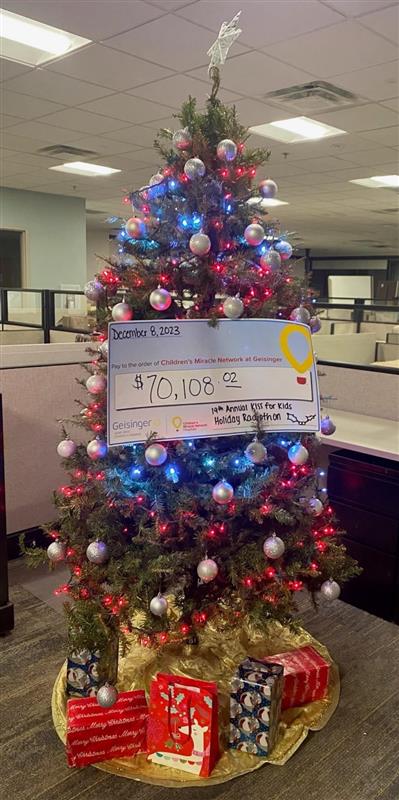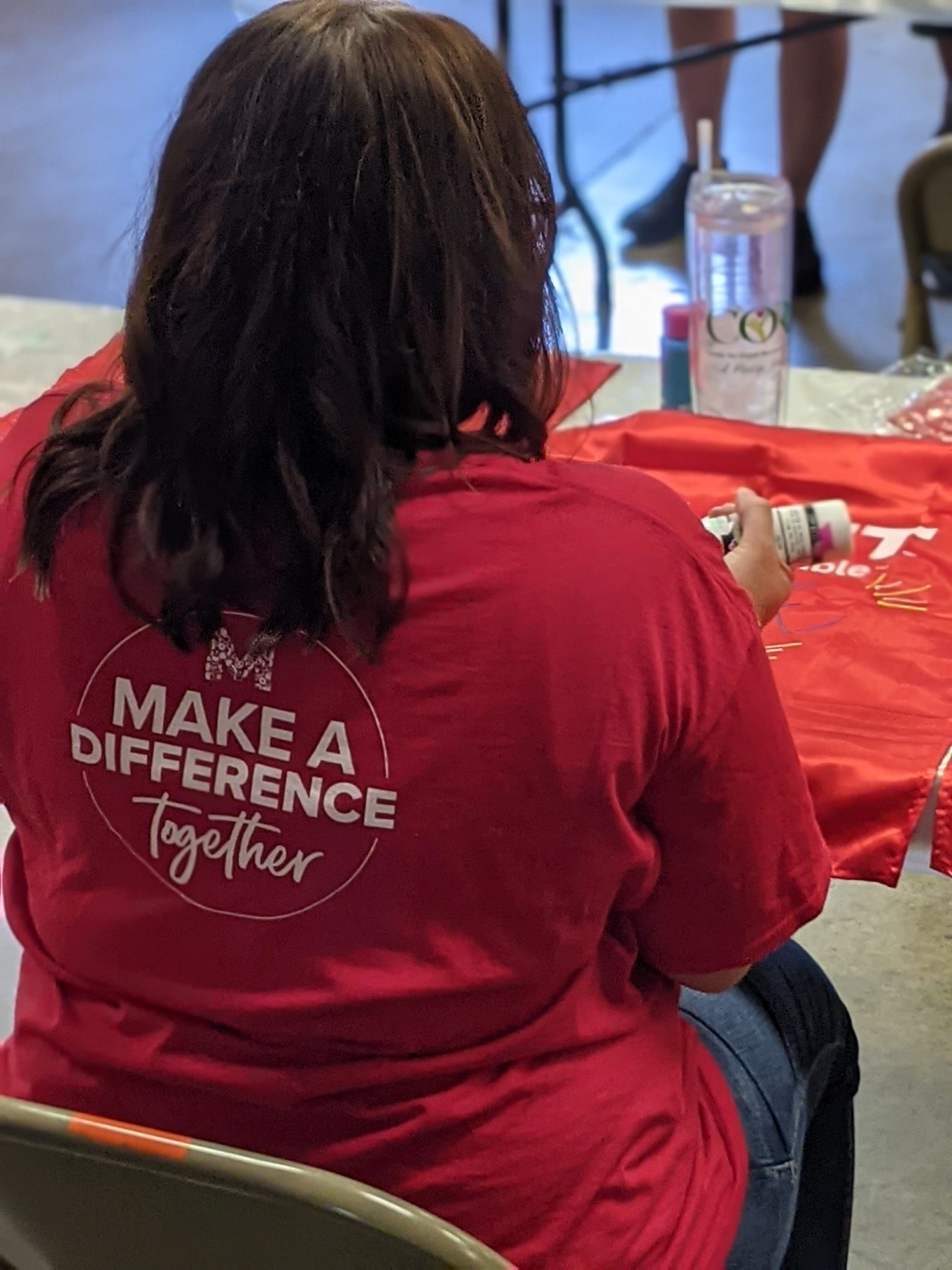2014 Miracle Kid Torin Haug

“Your child has cancer.”
Those are the last words a parent wants to hear and the last words that Kayla and James Haug expected when they took their then 4-year-old son Torin to the emergency room at Geisinger Medical Center, Danville.
It was a snowy day in January 2012. Torin and his sisters, McKenzie and Emma, came in from playing outside of their South Williamsport home. Torin was extremely tired and was not acting quite right and Kayla realized there was something wrong.
“He is an active little guy, and all of the sudden he was lying around and was unable to go to the bathroom,” Kayla said. “I took him to our family physician who said just to be safe she would like to order an x-ray.”
Kayla and James took Torin to the local community hospital for the x-ray and afterward the doctor requested a CT scan. After reviewing the results, the doctor suggested the Haugs take Torin to Geisinger Janet Weis Children’s Hospital in Danville.
“At that point we still had no clue what was going on, because obviously they are not going to say anything until they know what is wrong for sure,” Kayla said.
The first interaction the family had was with a resident in the emergency room. The resident explained that the X-ray and CT scan had shown a fairly large mass in Torin’s abdomen.
Afterward Pediatric Hematologist/Oncologist Michal Miller, MD, approached the family and shared the terrifying news.
“When you hear cancer, you automatically think death. You don’t really know what the treatments are, if it’s curable,” Kayla said. “I was at a loss and thought to myself, ‘I’m going to lose my kid.’”
“We lead really healthy lives and it was just a total shock for us to find out he had cancer,” James said. “We never expected it, or anticipated it or thought it would happen, until it was our son.”
The mass in Torin’s abdomen was 10 centimeters and was obstructing his urinary system.
“When Torin came to the emergency room he was going rapidly into renal failure due to the obstruction in his ureters,” said Jagadeesh Ramdas, M.D., director of Pediatric Hematology/Oncology at Geisinger Medical Center. “We had to find a way to immediately relieve that obstruction, because the kidneys were going to rapidly deteriorate.”
Torin’s potassium and electrolyte levels were dangerously high and doctors had to work quickly to relieve the urinary obstruction. The two best options were to either remove the mass or place a stent to create an outlet for urine. Because of the size of the mass and the way it was wrapped around his organs, both attempts were unsuccessful.
“The surgeon came in and said, ‘We couldn’t do anything. The mass is too big. I’m sorry,’” Kayla recalled. “I remember bursting out crying.”
“The way the mass wrapped around everything, they could not cut anything out without possibly damaging other organs,” James added.
Alfred Kennedy, MD, pediatric surgeon, was able to get a transrectal biopsy to allow for a thorough and rapid diagnosis by the pathology lab. When Dr. Miller returned to speak to the Haug’s, she was visibly relieved and happy with the finding.
“She was happy when she told us it was Burkitt’s lymphoma,” Kayla said. “I was standing there looking at her like, ‘Are you kidding me you are excited about this?’ She told us if you have cancer, this is the best cancer to have and the easiest to treat.”
Because of the rapid growth of Burkitt’s, Dr. Miller explained to the Haugs if they would have brought him in two weeks earlier, the softball-sized mass wouldn’t even had been there.
“She said we were lucky when we brought him in, because if it would have been a week later, he wouldn’t be with us,” Kayla said.
Burkitt’s lymphoma is a very uncommon cancer of the lymphatic system which starts in the immune cells and is recognized as the fastest growing human tumor. Out of one million cases of cancer each year, only two are diagnosed with Burkitt’s, according to Dr. Ramdas.
“The thing about Burkitt’s lymphoma is that it is one of the most rapidly growing tumors in mankind. It can double in size within 10 hours, so you have to initiate a rapid treatment,” Dr. Ramdas said. “The challenge in Torin’s case was when you do a treatment, you need to hydrate the patient with lots of fluids. Because this tumor was affecting his kidneys, if we did not relieve those symptoms immediately he was going to be in big trouble.”
An interventional radiologist placed bilateral external nephrostomy tubes in Torin to drain his kidneys. The plastic tubes enter the skin in the patient’s lower back and drain urine from the kidney.
“He was so miserable for that month, because he had the tubes and an incision and he couldn’t really do anything,” Kayla said.
Once an outlet for his urine was established, doctors began chemotherapy treatment.
“Burkitt’s lymphoma usually responds well to chemotherapy,” Dr. Ramdas said. “We gave Torin multiple rounds and he had an extremely good response. Burkitt’s lymphoma treatments are very intense but very short. His treatment started in January and he was done by May of 2012.”
Torin had many complications during his treatment which required long stays for he and Kayla.
“He had poor luck,” James said. “They would send him home for a week and then he would go back down. There wasn’t one treatment where he was able to stay home all week. After a couple days, he would have to be admitted because his blood counts would go too low and he was at risk of infections.”
During Torin’s numerous stays, Kayla was able to stay by his side in his hospital room.
“I had the option of going to the Ronald McDonald House [in Danville], but I wanted to be next to him,” Kayla said. “The interaction with the staff was amazing. Everyone was excellent. Any questions I had, they filled me in with everything. I was there so much, it just felt like home.”
Torin was in the hospital so often during treatment that the staff joked that he and another boy in the hospital were running for “King of the Floor” for who was there the most.
“The staff was incredible,” Kayla said.
During his time at Geisinger Janet Weis Children’s Hospital, Torin went through some very painful procedures, according to Dr. Ramdas.
“He needed support and familiar faces with him to help him get through these things,” he said. “One of the neat things we have is the Child Life program. They helped decrease his anxiety for many of these procedures.”
The Child Life Department works to allow kids to be kids during their stay in the children’s hospital and Kayla said they did an excellent job of providing that atmosphere.
The Haugs said the Child Life staff kept Torin happy and content in a not-so-happy situation.
“They asked if he wanted coloring books, if he wanted to paint or what activity he wanted to do,” Kayla said. “During one admission around Easter, Torin painted eggs.”
“He really enjoyed the dog visits, when his health was good,” James said, speaking about the visits of therapy dogs directed by the Child Life Department.
The kid-friendly amenities that Janet Weis Children’s Hospital offers also went a long way in providing comfort and distraction.
“We always made sure we went down to see the turtles every day,” Kayla said of the turtle fountain in the lobby of the hospital.
It wasn’t just the staff and the facilities at the hospital that were extraordinary but also the patients according to Kayla.
“I will always remember, I was feeling depressed and it was Valentine’s Day. I was just mopey,” she said. “A little girl on the floor who was going through treatments brought me a rose. It was so touching. It always seemed like the kids going through the treatments were the happy ones and the parents were the wrecks.”
Torin has been healthy since his last treatment and is tumor free. He now only visits the Pediatric Oncology clinic in Danville every four months.
“He made his year in May, which is awesome,” Kayla said.
The Haugs are grateful for the staff and doctors at Janet Weis Children’s Hospital that helped in their son’s diagnosis and treatment.
“We were fortunate to be able to quickly make a diagnosis, and start immediate treatment,” Dr. Ramdas said. “Torin was very close to having a major complication and because of his potassium levels, he could have died that night in the emergency room.
“In Burkitt’s the key factor is rapid diagnosis. One of the critical things in pathology that allows for rapid diagnosis is immunophenotyping and cytogentics. The pathology lab is supported by Children’s Miracle Network activities.”
Donations to Children’s Miracle Network help support the pathology lab and the Child Life Department.




